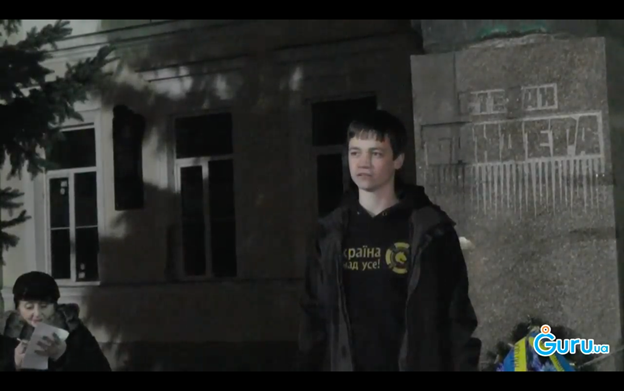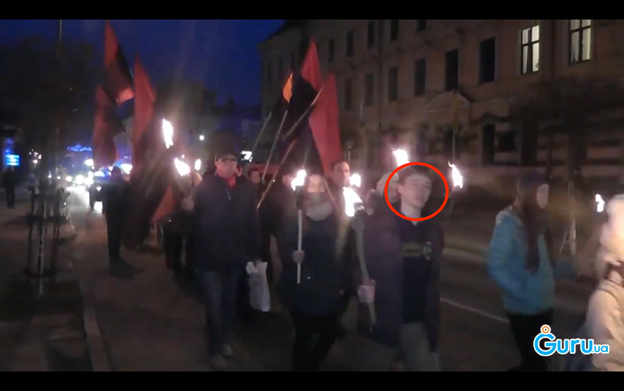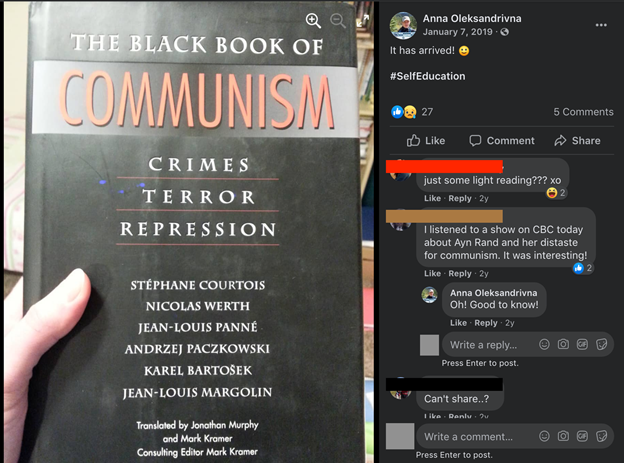Canada's 'Banderite' Ukrainian Lobby Cancels Russian Professor
Written by: Moss Robeson
On the evening of March 30, the Canadian Institute for Ukrainian Studies (CIUS) at the University of Alberta cancelled a Zoom lecture it had scheduled for the following day with Alexei Miller, director of the Center for Memory Studies at the European University at St. Petersburg. The title of the cancelled event was “On the Ruins of Two Empires: Identity Politics in Contemporary Russia.”
Less than 24 hours before the lecture was scheduled to start, a Ukrainian journalist employed by the U.S. government-funded Radio Svoboda made an angry Facebook post about the event’s flier showing Crimea as part of Russia.
The CIUS, based in Edmonton, quickly took responsibility, apologized, and fixed the flier, but by then, Anna Oleksandrivna, a Canadian “Banderite,” had already shared the journalist’s post, tagged two dozen other accounts, and demanded that Miller’s lecture be “CANCELED IMMEDIATELY!”
By “Banderite,” I mean someone affiliated (in some cases unwittingly) with the clandestine OUN-B, the “revolutionary” faction of the Organization of Ukrainian Nationalists first led by Stepan Bandera—the infamous wannabe Hitler of Ukraine, assassinated by the KGB in 1959.
Part of Oleksandrivna’s “#SelfEducation,” The Black Book of Communism is a debunked right-wing text that according to The Grayzone “has been widely criticized for trivializing the Holocaust, sympathizing with Nazi collaborators and enabling neo-fascist political forces to rewrite history.”
During the Cold War, the OUN-B hijacked much of the organized Ukrainian diaspora. Today the Banderites dominate the Ukrainian World Congress and to a lesser extent the Ukrainian Canadian Congress, both headquartered in Toronto. The Canadian coalition of OUN-B “facade structures” is called the Canadian Conference in Support of Ukraine (CCSU).
Anna Oleksandrivna is a member of the Ukrainian Youth Association (CYM), which in turn is a member of the CCSU and otherwise well known to be an OUN-B affiliated group. CYM is an international organization, and its Canadian branch is among the most shameless when it comes to glorifying fascist Nazi collaborators like Bandera.
Canadian members of CYM honoring OUN-B leader Yaroslav Stetsko (d.1986)--a longtime deputy to Stepan Bandera, also a fascist ideologue, Nazi collaborator, vicious antisemite, and war criminal.
At CYM’s youth complex in Edmonton, there is a larger than life bust of Roman Shukhevych, a war criminal who served as a captain in a German auxiliary police battalion in 1941-42 before commanding the OUN-B’s Ukrainian Insurgent Army as it waged a massive, anti-Polish ethnic cleansing campaign.
In her Facebook post inviting others to join her in pressuring the University of Alberta to cancel the event, Anna Oleksandrivna tagged numerous pages and individuals, about half of them fellow Banderites, including Taras Podilsky, Yuri Broda, and Martyn Stusiak.
Podilsky has been identified as a spokesperson for the CYM complex in Edmonton and the local president of the League of Ukrainian Canadians, which is the vanguard of the Banderite network in Canada.
Broda is the son of a provocative local Banderite leader with a history of interrupting CIUS events that offend Ukrainian nationalists. According to Broda Sr., Ukrainians “did not know the Holocaust was happening,” and Shukhevych’s legacy is “safe with those who understand his perspective.”
Stusiak lives in Edmonton but hails from Stryi, a small city in western Ukraine where he led the OUN-B’s far-right, antisemitic Youth Nationalist Congress (MNK), which he remains a member of in Canada.
The two images below are of Martyn Stusiak at a torchlit MNK march and speaking in front of a Bandera monument in Stryi, 2015


Anna Oleksandrivna also tagged the Facebook group, “Ukrainians in Edmonton,” and its administrator Ivan Lypovyk, who promptly posted about the CIUS lecture in his private group: “IMPORTANT!!! Важливо!!!”
Lypovyk tagged, among others, the Consul General of Ukraine in Edmonton, a few people who work at the University of Alberta, and a former president of the Ukrainian Canadian Congress. The latter, Mykola Vorotylenko, was interviewed last year by a leader of the National Corps party, which is the political wing of the neo-Nazi Azov movement in Ukraine.
Vorotylenko and Lypovyk are board members of the Ukrainian National Federation (UNF), which is affiliated—at least historically—with the OUN-M, the other major faction of the Organization of Ukrainian Nationalists (named for Andriy Melnyk). The OUN-M is allegedly still active in Canada, and according to Ukrainian Wikipedia, the UNF remains under OUN-M influence.
The symbols of the OUN-M (left) and Ukrainian National Federation (right)
Ivan Lypovyk has been the vice president of the UNF in Edmonton since 2009, and Mykola Vorotylenko is the deputy chairman of the board of directors of the Edmonton branch. This suggests that Vorotylenko and Lypovyk could be leading members of the local OUN-M network, assuming there is one.
In Lypovyk’s private Facebook post, he dug up comments by Russian historian Alexei Miller in which he expressed reasonable doubt that the 1932-33 famine in Ukraine, widely known today as the Holodomor, constituted a genocide.
The Canadian government recognizes the famine as a genocide, but there isn’t an academic consensus on the issue, including at the University of Alberta. In any case, Miller presumably didn’t plan on debating the “Holodomor genocide” in his lecture on contemporary Russian identity politics.
Ivan Lypovyk is married to Bohdana Stepanenko-Lypovyk, who has worked for the Albertan government since 2014 as a policy analyst focused on maximizing the profits of Alberta’s tar sands industry—“the world’s most destructive oil operation,” according to National Geographic.
Mr. and Mrs. Lypovyk might be “Melnykites,” but they seem to be close with one of the most prominent members of the OUN-B: Volodymyr Viatrovych, “The Historian Whitewashing Ukraine’s Past.” For starters, Viatrovych attended their wedding in Ukraine, and Ivan Lypovyk has known him since 2004.
Volodymyr Viatrovych is standing third to the left, and to the right of him is Oleksandr Danyleiko, the Consulate General of Ukraine in Edmonton.
Viatrovych was the architect of Ukraine’s controversial and divisive “decommunization” laws in 2015, which according to historian Tarik Cyril Amar, “leave no room for either nationalism’s victims in the past or alternatives to nationalism in the present and future.”
All those pictured in these photos by Ivan Lypovyk--Borys Potapeko (at the podium, above), Hennady Ivanushchenko, Volodymyr Viatrovych (at the podium, below), and Serhiy Kvit--are OUN-B members.
Ivan Lypovyk has claimed to be close friends with Andriy Kohut, the head of the State Archives of the Ukrainian Security Service. Kohut, like Viatrovych, previously directed the Center for Research on the Liberation Movement, an OUN-B front based in Lviv.
As it were, the Radio Svoboda contributor who sparked the whole uproar on Facebook formerly worked at the Ukrainian Institute of National Memory (2014-16) when it was directed by Volodymyr Viatrovych.
By the time that Bohdana Stepanenko-Lyopvyk posted on Facebook calling for Alexei Miller’s lecture to be canceled, the flier had been updated, to no avail. “By inviting to give a lecture by a pro-Russian imperialist,” she declared,
“CIUS not only supports misinformation created by Russia to fight Ukraine in the ‘cold war,’ but also goes against beliefs, and policies of the Canadian government. I, AS A DUAL CITIZEN OF CANADA AND UKRAINE, REQUEST CIUS TO CANCEL THIS LECTURE AND PAY MORE ATTENTION TO THE VIEWS AND BELIEFS OF PEOPLE THEY INVITE TO GIVE LECTURES TO UKRAINIAN DIASPORA IN CANADA.”
Stepanenko-Lypovyk then posted in the comments a screenshot of Alexei Miller sharing a Facebook post by Eduard Dolinsky, the director general of the Ukrainian Jewish Committee, about the Canadian Banderites’ covert campaign against Swedish historian Per Rudling.
She also shared the screenshot in the “Ukrainians in Edmonton” group, where a CYM member, blood boiling, declared, “All bets are off. I cannot accept seeing public money wasted on fake scholarship that is actually propaganda furthering kremlin imperialist lies.” Meanwhile, the CIUS Facebook page received a flood of comments like, “are you kidding me!!!!” and “Shame on you! Stop support Russian propaganda!”
Elsewhere on Facebook, Ivan Lypovyk, Anna Oleksandrivna, and Martyn Stusiak agreed to show up in person the next day at the University of Alberta if CIUS didn’t cancel the online event. According to Lypovyk, it was called off at 10 pm. “Lucky for them,” he commented. Alexei Miller said the event was cancelled due to threatening emails; Stasiuk called him a liar.
In the comment section of Anna Oleksandrivna’s Facebook post, the Consul General of Ukraine in Edmonton thanked the Ukrainian community for its vigilance and “active pro-Ukrainian position.” He said the Consulate had privately reached out to the CIUS about the lecture.
According to Grzegorz Rossolinski-Liebe, author of the pioneering biography of Stepan Bandera, The Life and Afterlife of a Ukrainian Nationalist: Fascism, Genocide, and Cult, when the CIUS hosted Viatrovych in 2010, “it did not comment on his denial-oriented and obfuscating agenda or explain why it had decided to invite him.”
To my knowledge, the Canadian Institute of Ukrainian Studies in Edmonton has not explained why it canceled Alexei Miller’s lecture either.
Moss Robeson is an independent researcher focused on the present-day Banderite network. For more, follow him on Twitter (@mossrobeson__) and subscribe to his ‘Bandera Lobby Blog’.
More Articles











